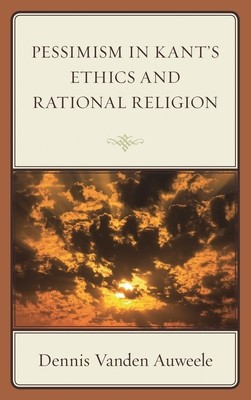
- We will send in 10–14 business days.
- Author: Dennis Vanden Auweele
- Publisher: Lexington Books
- ISBN-10: 1498580394
- ISBN-13: 9781498580397
- Format: 15.5 x 23.1 x 2.3 cm, kieti viršeliai
- Language: English
- SAVE -10% with code: EXTRA
Pessimism in Kant's Ethics and Rational Religion (e-book) (used book) | bookbook.eu
Reviews
Description
The historical period of the Enlightenment is usually thought of as the high point of philosophical optimism. By breaking the chains of traditional heteronomous morality, the tutelage of dogmatic religion and the oppression of authoritarian politics, the Enlightenment created the space for a new, self-critical and autonomous frame of reference for human effort. Immanuel Kant is undoubtedly the greatest philosopher in the German Enlightenment. And Kant was a pessimist? In this book, the author explores Kant's moral and religious philosophy and shows that a pessimistic undercurrent pervades these. This provides a new vantage point not only to assess comprehensively Kantian philosophy but also to provide much needed context and reading assistance to the general premises of Kant's philosophy of autonomy and rationality. For Kant, to be autonomous and rational is not something human nature naturally pursues; instead, reason but must reframe, rethink and reshape human nature. Human nature is a problem, autonomy and rationality are the solution. Kant's subsequent attempts to establish a rational religion can be explained in extension of this problem. Since human beings are not naturally prone to act autonomously, they have to be educated through historical institutions that are reformed appropriately so as to provide the incentives for human beings to become autonomous. This is where Kant believed religion could play an important pedagogical function.
EXTRA 10 % discount with code: EXTRA
The promotion ends in 23d.03:26:56
The discount code is valid when purchasing from 10 €. Discounts do not stack.
- Author: Dennis Vanden Auweele
- Publisher: Lexington Books
- ISBN-10: 1498580394
- ISBN-13: 9781498580397
- Format: 15.5 x 23.1 x 2.3 cm, kieti viršeliai
- Language: English English
The historical period of the Enlightenment is usually thought of as the high point of philosophical optimism. By breaking the chains of traditional heteronomous morality, the tutelage of dogmatic religion and the oppression of authoritarian politics, the Enlightenment created the space for a new, self-critical and autonomous frame of reference for human effort. Immanuel Kant is undoubtedly the greatest philosopher in the German Enlightenment. And Kant was a pessimist? In this book, the author explores Kant's moral and religious philosophy and shows that a pessimistic undercurrent pervades these. This provides a new vantage point not only to assess comprehensively Kantian philosophy but also to provide much needed context and reading assistance to the general premises of Kant's philosophy of autonomy and rationality. For Kant, to be autonomous and rational is not something human nature naturally pursues; instead, reason but must reframe, rethink and reshape human nature. Human nature is a problem, autonomy and rationality are the solution. Kant's subsequent attempts to establish a rational religion can be explained in extension of this problem. Since human beings are not naturally prone to act autonomously, they have to be educated through historical institutions that are reformed appropriately so as to provide the incentives for human beings to become autonomous. This is where Kant believed religion could play an important pedagogical function.


Reviews